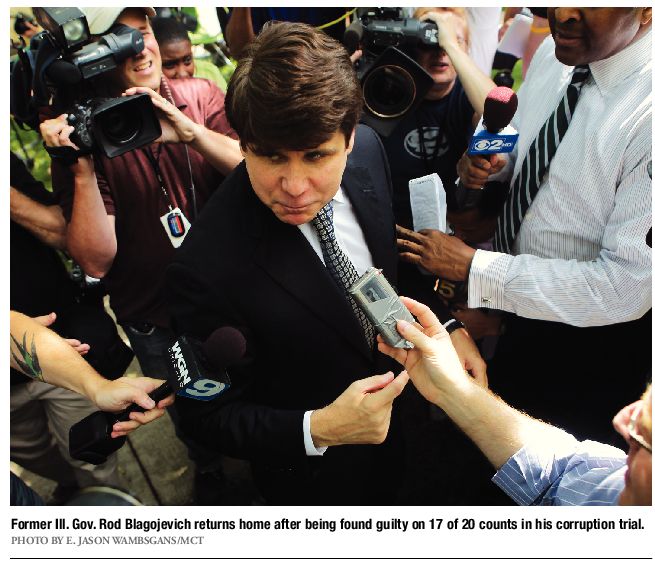Put voters on trial next
Why political reform never seems to work in Illinois
DYSPEPSIANA | James Krohe Jr.

At last, we have a verdict on the governor. Within hours of its announcement, deliberations began in the press to decide the guilt or innocence of the people who elected him twice as Illinois’s chief executive officer. The verdict? The voters are guilty of apathy, ignorance, scandal fatigue and an insensitivity to manipulation that rivals that of a corpse on the embalmer’s table. The jury is hung on the count of gullibility, but my own view is that a Blago is what people get when what they want to hear most from their candidates is what they most want to hear.
Illinois voters at their worst remind me of the guy who drives off to work and leaves his garage door open; does carelessness of that order make him a victim of the guy who steals his lawnmower, or his accomplice? Most of the post-impeachment reforms urged by Mr. Quinn and others amounted to homeopathic cures. The cure for the ills of self-government is not more self-government.
Give voters expanded powers to recall errant politicians? More open elections? Better candidates? Recall campaigns are as vulnerable to hysteria as general elections are vulnerable to indifference. As for the promise of open primaries to give Illinois voters better candidates, that hardly means that Illinois will get better officials. Even the flawed present system has given the state many a fine candidate for governor, but while Illinois remains a place where the best man or woman may win, it also is a place where she or he almost never will. Printing photos on ballots of George Ryan in his prison jumpsuit and handcuffs, like showing cancer victims on cigarette packs, would do more good.
To elect better candidates you need better voters. Suggestions that this might be done by shrinking the voter pool are like child pornography; I will mention it because it matters, but I have no intention of looking at it closely. The notion that ignorance (or apathy that abets ignorance) is at the heart of the problem is much more popular. As the executive director of Bradley University’s Institute for Principled Leadership in Public Service, put it to Decatur’s Herald & Review, “I sure hope the voters of
Illinois will try to do their homework a little better next time.”
Ignorance is, occasionally, remediable. It also is not quite the source of the poor performance of Illinois voters over the years. Illinois elections tend to be contests not between the ignorant v. the informed, the Chicago v. the Downstate or even Democrats v. Republicans, at least not directly. All these categories are useful to describe political results because they are manifestations of deep and enduring cultural differences that have been summed up by people much cleverer than I am as the individualist v. the moral.
The dominant political culture in Illinois is individualistic. It is characterized by social and personal traits that were first imported to the Illinois territory from the upland South, and have been renewed periodically ever since by like-minded migrants from other places. Were anyone to open a museum and need a specimen of this political type, the regrettable Mr.
Blagojevich’s post-gubernatorial career might be spent pickled in a jar. Loyalty is to one’s faith, to one’s clan (understood these days in terms of ethnic groups as well as blood kin) and to one’s caste. The individualistic world view tends to be antagonistic to law, to power and to the rule of superiors (however defined).
Reformers tend to wave the flag of the moral political culture. If the individualist sees society as a threat to freedom, the communally mindedreformer sees society as the context of it. The template against which the individualist measures most political propositions is us v. them, that of the political moralist is right v. wrong.
Politics in Illinois thus can only be understood as a diversity issue. The perennial struggle of corruption v. reform is in fact a clash of value systems that are at odds about the conduct of public affairs, about the scope of the public realm, about the obligations of the elected to the public and of the public to each other. Asking people who don’t believe in the public weal to sacrifice for the public weal will not succeed over the long term, because it never has in Illinois.
In a well-ordered state dreamed of by such worthy activists as the Illinois Campaign for Political Reform, reform would empower the voters and give them the means to bring their better private instincts to bear on public problems. The law would make it possible for voters, acting collectively, to rid themselves of manifestly wonky officials, to nominate and support plausible alternatives to them and to impose standards of conduct more likely to advance the public interest than that of the public’s agents. It is an Illinois in which I would feel right at home. Alas, it also is a fantasy, akin to the Iraq imagined by George W. Bush.
Contact James Krohe Jr. at [email protected].
Editor’s note
As we searched for an insightful word on the Blagojevich verdict, IT reader Dan McGuire of Bensenville sent us this:
GOLDEN BOY There once was a governor named Rod Who thought that his job made him God. He had bait he was holdin,’ That he called f—-in’ golden, But his fishing attempts got him scrod.
—Fletcher Farrar, editor